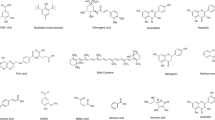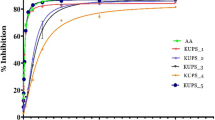Abstract
Doxorubicin (DOX) is a potent anticancer drug; its use has been limited by its hepatotoxicity, which is due to free radicals generation. This work aims to investigate whether the n-butanol soluble part of the 70% methanol extract of the aerial parts of Moricandia arvensis, alleviates doxorubicin-induced hepatotoxicity. According to the literature data, Moricandia arvensis (Brassicaceae) is renowned for its richness in flavonoid and phenolic acid glycosides. In this work, we have rightly assessed the total phenolic and flavonoid contents of the studied extract (n-butanol extract). The results obtained (TPC: 86.25 ± 0.00 µg GAE/mg; TFC: 22.54 ± 0.01 µg QE/mg) encouraged us to continue our investigations. Wistar albino rats were orally administered with n-butanol extract of M. arvensis (50 mg/kg and 100 mg/kg body weight) or vitamin E as a standard antioxidant (100 mg/kg) for 10 days; and DOX (15 mg/kg on the 8th day that was intraperitoneally injected. At the end of the experiment, blood and liver samples were analyzed for biomarker levels and histopathological changes. Liver homogenates were used to determine oxidative stress parameters such as malondialdehyde (MDA), glutathione peroxidase (GPX) and glutathione (GSH) activity. DOX-administered rats significantly increased different levels of the serum biochemical parameters, increased TBARS level, decreased GPx activity and GSH level in the liver. In addition, M. arvensis (50 mg/kg and100 mg/kg) n-butanol extract treatments significantly decreased the level of TBARS, increased GSH level and GPx activity compared to the DOX-treated rats (p < 0.01). The histological study revealed the hepatoprotective effects of the tested extract on DOX-induced toxicity. This was demonstrated by the preservation of hepatic architecture as well as a reduction in structural and functional changes in the liver. The obtained results indicate a protective action of n-butanol extract of M. arvensis that could be the result of the inhibition of reactive oxygen species (ROS) generation. This may be the result of the presence of phenolic compounds in M. arvensis plant.




Similar content being viewed by others
References
Abdel-Sattar E, El-Gayed SH, Shehata I, Ashour OM, Nagy AA, Mohamadin AM (2012) Antioxidant and cardioprotective activity of Stachys schimperi Vatke against doxorubicin-induced cardiotoxicity. Bull Fac Pharm Cairo Univ 50(1):41–47. https://doi.org/10.1016/j.bfopcu.2012.01.002
Afsar T, Razak S, Batoo KM, Khan MR (2017) Acacia hydaspica R. Parker prevents doxorubicin-induced cardiac injury by attenuation of oxidative stress and structural cardiomyocyte alterations in rats. BMC Complement Altern Med 17(1):554. https://doi.org/10.1186/s12906-017-2061-0
Afsar T, Razak S, Almajwal A (2019) Effect of Acacia hydaspica R Parker extract on lipid peroxidation, antioxidant status, liver function test and histopathology in doxorubicin treated rats. Lipids Health Dis 18(1):126. https://doi.org/10.1186/s12944-019-1051-2
Ahmed OM, Abdul-Hamid MM, El-Bakry AM, Mohamed HM, Rahman FE-ZSA (2019) Camellia sinensis and epicatechin abate doxorubicin-induced hepatotoxicity in male Wistar rats via their modulatory effects on oxidative stress, inflammation, and apoptosis. J Appl Pharm Sci 9(04):030–044. https://doi.org/10.7324/JAPS.2019.90405
Aksu EH, Kandemir FM, Yıldırım S, Küçükler S, Dörtbudak MB, Çağlayan C, Benzer F (2019) Palliative effect of curcumin on doxorubicin-induced testicular damage in male rats. J Biochem Mol Toxicol 33(10):e22384. https://doi.org/10.1002/jbt.22384
Al-Oanzi ZH, Elasbali AM, Alruwaili NK, Alotaibi NH, Alharbi KS, Alzarea AI, Alsuwayt BH, Al-Enazi MM (2020) Protective effect of baicalein alone and losartan–baicalein combination therapy on doxorubicin-induced hepatotoxicity in rats. Toxicol Environ Health Sci. https://doi.org/10.1007/s13530-020-00037-7
Belkhiri A, Lockwood BG (1990) An indole derivative and glucosinolates from Moricandia arvensis. Phytochemistry 29(4):1315–1316
Berreghioua A, Cheriti A, Belboukhari N (2016) Flavonoids from the antibacterial extract of Moricandia arvensis L. growing in Algerian Sahara. Der Pharm Lett 8(4):45–49
Bilgic S, Ozgocmen M (2019) The protective effect of misoprostol against doxorubicin induced liver injury. Biotech Histochem 94(8):583–591. https://doi.org/10.1080/10520295.2019.1605457
Biondo LA, Lima Junior EA, Souza CO, Cruz MM, Cunha RD, Alonso-Vale MI, Oyama LM, Nascimento CMO, Pimentel GD, Dos Santos RV (2016) Impact of doxorubicin treatment on the physiological functions of white adipose tissue. PLoS ONE 11(3):e0151548. https://doi.org/10.1371/journal.pone.0151548
Braham H, Mighri Z, Jannet H, Matthew S, Abreu P (2005) Antioxidant phenolic glycosides from Moricandia arvensis. J Nat Prod 68(4):517–522. https://doi.org/10.1021/np049581m
Cartea ME, Francisco M, Soengas P, Velasco P (2011) Phenolic compounds in Brassica vegetables. Molecules 16(1):251–280. https://doi.org/10.3390/molecules16010251
Carvalho C, Santos RX, Cardoso S, Correia S, Oliveira PJ, Santos MS, Moreira PI (2009) Doxorubicin: the good, the bad and the ugly effect. Curr Med Chem 16(25):3267–3285. https://doi.org/10.2174/092986709788803312
Djebbari R, Chemam Y, Boubekri N, Lakroun Z, Kebieche M, Amrani A, Benayache F, Benayache S, Zama D (2017) Chemoprotective potential of Helianthemum confertum against the loss of molecular and functional integrity of the liver cell in doxorubicin-treated rats. Int Pharmacogn Phytochem Res 9(7):903–910
El-Din AE, Ali MHM, Ahmed ES, Hassanane MM, Khalil WKB (2018) Ameliorative effect of Zygophyllum album extract against hepatotoxicity induced by doxorubicin in male mice. Pharmacology 14(3):421–427
Ellman G (1959) Plasma antioxidants. Arch Biochem Biophys 82:70–77
Fahey JW, Zalcmann AT, Talalay P (2001) The chemical diversity and distribution of glucosinolates and isothiocyanates among plants. Phytochemistry 56(1):5–51
Fathy AH, Bashandy MA, Mansour AM, Azab K, Bashandy SA (2017) Hepatoprotective effects of olive oil with fig and date-palm fruit extracts in rats treated with doxorubicin and gamma radiation. Adv Pharm Ethnomed 5(1):8–15. https://doi.org/10.17582/journal.ape/2017/5.1.8.15
Flohé L, Günzler WA (1984) [12] Assays of glutathione peroxidase. Methods Enzymol 105:114–120. https://doi.org/10.1016/S0076-6879(84)05015-1
Gidik B, Gül V, Sefali A (2019) A study of wild plant species of Brassicaceae family in Bayburt region of Turkey. Pak J Bot 51(2):681–687. https://doi.org/10.30848/PJB2019-2(33)
Gonçalves S, Moreira E, Grosso C, Andrade PB, Valentão P, Romano A (2017) Phenolic profile, antioxidant activity and enzyme inhibitory activities of extracts from aromatic plants used in Mediterranean diet. J Food Sci Technol 54(1):219–227. https://doi.org/10.1007/s13197-016-2453-z
Gu Y, Ju A, Jiang B, Zhang J, Man S, Liu C, Gao W (2018) Yiqi fumai lyophilized injection attenuates doxorubicin-induced cardiotoxicity, hepatotoxicity and nephrotoxicity in rats by inhibition of oxidative stress, inflammation and apoptosis. RSC Adv 8(71):40894–40911
Ibrahim Fouad G, Ahmed KA (2021) Neuroprotective potential of Berberine against doxorubicin-induced toxicity in rat’s brain. Neurochem Res 46:3247–3263. https://doi.org/10.1007/s11064-021-03428-5
Jain SK, Kanikarla-Marie P, Warden C, Micinski D (2016) L-cysteine supplementation upregulates glutathione (GSH) and vitamin D binding protein (VDBP) in hepatocytes cultured in high glucose and in vivo in liver, and increases blood levels of GSH, VDBP, and 25-hydroxy-vitamin D in Zucker diabetic fatty rats. Mol Nutr Food Res 60(5):1090–1098. https://doi.org/10.1002/mnfr.201500667
Kabel AM (2018) Zinc/alogliptin combination attenuates testicular toxicity induced by doxorubicin in rats: role of oxidative stress, apoptosis and TGF-β1/NF-κB signaling. Biomed Pharmacother 97:439–449. https://doi.org/10.1016/j.biopha.2017.10.144
Kalender Y, Yel M, Kalender S (2005) Doxorubicin hepatotoxicity and hepatic free radical metabolism in rats: the effects of vitamin E and catechin. Toxicology 209(1):39–45. https://doi.org/10.1016/j.tox.2004.12.003
Mansouri E, Jangaran A, Ashtari A (2017) Protective effect of pravastatin on doxorubicin-induced hepatotoxicity. Bratisl Lek Listy 118(5):273–277. https://doi.org/10.4149/bll_2017_054
Marrelli M, Morrone F, Argentieri MP, Gambacorta L, Conforti F, Avato P (2018) Phytochemical and biological profile of Moricandia arvensis (L.) DC.: an inhibitor of pancreatic lipase. Molecules 23(11):2829. https://doi.org/10.3390/molecules2311282923:2829
Mecheri A, Benabderrahmane W, Amrani A, Boubekri N, Benayache F, Benayache S, Zama D (2018) Hepatoprotective effects of Algerian Crataegus oxyacantha leaves. Recent Pat Food Nutr Agric 10(1):70–75. https://doi.org/10.2174/2212798410666180730095456
Moussa FI, El-gawad A, Horeya S, Mahmoud SS, Mahboub FA, Abdelseyd SG (2020) Protective effect of omega-3 on doxorubicin-induced hepatotoxicity in male albino rats. J Biosci Appl Res 6(4):207–219. https://doi.org/10.21608/JBAAR.2020.119773
Omobowale TO, Oyagbemi AA, Ajufo UE, Adejumobi OA, Ola-Davies OE, Adedapo AA, Yakubu MA (2018) Ameliorative effect of gallic acid in doxorubicin-induced hepatotoxicity in Wistar rats through antioxidant defense system. J Diet Suppl 15(2):183–196. https://doi.org/10.1080/19390211.2017.1335822
Paudel K, Ramamurthy A, Sharma G (2020) Some important hepatoprotective medicinal plants in Ayurveda- a review. Int J Ayurveda Res 3(8):138–150. https://doi.org/10.47223/IRJAY.2020.3815
Quezel P, Santa S (1962) Nouvelle flore de L’Algérie et des régions désertiques méridionales. Tome 1, P. 426, Edition du Centre National de la Recherche Scientifique, Paris
Ramos D, Gaspar J, Pingarilho M, Gil O, Fernandes A, Rueff J, Oliveira N (2011) Genotoxic effects of doxorubicin in cultured human lymphocytes with different glutathione S-transferase genotypes. Mutat Res Gene Toxicol Environ Mutagenes 724(1–2):28–34. https://doi.org/10.1016/j.mrgentox.2011.04.013
Rashid S, Ali N, Nafees S, Ahmad ST, Arjumand W, Hasan SK, Sultana S (2013) Alleviation of doxorubicin-induced nephrotoxicity and hepatotoxicity by chrysin in Wistar rats. Toxicol Mech Methods 23(5):337–345. https://doi.org/10.3109/15376516.2012.759306
Renu K, Sruthy KB, Parthiban S, Sugunapriyadharshini S, George A, Tirupathi Pichiah PB, Suman S, Abilash VG, Arunachalam S (2019) Elevated lipolysis in adipose tissue by doxorubicin via pparα activation associated with hepatic steatosis and insulin resistance. Eur J Pharmacol 843:162–176. https://doi.org/10.1016/j.ejphar.2018.11.018
Rivankar S (2014) An overview of doxorubicin formulations in cancer therapy. J Cancer Res Ther 10(4):853. https://doi.org/10.4103/0973-1482.139267
Sikandar A, Farhat K, Hamza A (2019) Evaluation and comparison of the hepatoprotective effects of trimetazidine and lovastatin against doxorubicin-induced hepatotoxicity. Int J Basic Clin Pharmacol 8(4):693–699. https://doi.org/10.18203/2319-2003.ijbcp20191102
Singleton VL, Orthofer R, Lamuela-Raventós RM (1999) [14] Analysis of total phenols and other oxidation substrates and antioxidants by means of folin-ciocalteu reagent. Method Enzymol 299:152–178. https://doi.org/10.1016/S0076-6879(99)99017-1
Siva D, Abinaya S, Rajesh D, Archunan G, Padmanabhan P, Gulyás B, Achiraman S (2022) Mollification of doxorubicin (DOX)-mediated cardiotoxicity using conjugated chitosan nanoparticles with supplementation of propionic acid. Nanomaterials 12(3):502. https://doi.org/10.3390/nano12030502
Skandrani I, Boubaker J, Bhouri W, Limem I, Kilani S, Sghaier MB, Neffati A, Bouhlel I, Ghedira K, Chekir-Ghedira L (2010) Leaf extracts from Moricandia arvensis promote antiproliferation of human cancer cells, induce apoptosis, and enhance antioxidant activity. Drug Chem Toxicol 33(1):20–27. https://doi.org/10.3109/01480540903376215
Skandrani I, Leloup L, Kovacic H, Dijoux-Franca MG, Ghedira K, Chekir-Ghedira L (2017) Antioxidant, antimutagenic, tanning and calpain induction activities of methanolic extract of Tunisian plant (Moricandia arvensis). Iran J Pharm Res 16:119–134
Uchiyama M, Mihara M (1978) Determination of malonaldehyde precursor in tissues by thiobarbituric acid test. Anal Biochem 86(1):271–278. https://doi.org/10.1016/0003-2697(78)90342-1
Utomo RY, Novarina A, Tirtanirmala P, Kastian RF, Jenie RI (2018) Enhancement of cytotoxicity and apoptosis induction of doxorubicin by Brazilein containing fraction of secang (Caesalpinia sappan L.) on T47D Cells. Indones J Cancer Chemoprevent 9(1):32–40
Wali AF, Rashid S, Rashid SM, Ansari MA, Khan MR, Haq N, Alhareth DY, Ahmad A, Rehman MU (2020) Naringenin regulates doxorubicin-induced liver dysfunction: impact on oxidative stress and inflammation. Plants 9(4):550. https://doi.org/10.3390/plants9040550
Wang H, Gao XD, Zhou GC, Cai L, Yao WB (2008) In vitro and in vivo antioxidant activity of aqueous extract from Choerospondias axillaris fruit. Food Chem 106(3):888–895. https://doi.org/10.1016/j.foodchem.2007.05.068
Zeraib A, Ramdani M, Lograda T, Chalard P, Figueredo G (2011) Chemical composition and antimicrobial activity of essential oil of Moricandia arvensis L.(DC.). Asian J Plant Sci 10(6):342–346. https://doi.org/10.3923/ajps.2011.342.346
Zhao X, Zhang J, Tong N, Chen Y, Luo Y (2012) Protective effects of berberine on doxorubicin-induced hepatotoxicity in mice. Biol Pharm Bull 35(5):796–800. https://doi.org/10.1248/bpb.35.796
Zhu H, Sarkar S, Scott L, Danelisen I, Trush MA, Jia Z, Li YR (2016) Doxorubicin redox biology: redox cycling, topoisomerase inhibition, and oxidative stress. React Oxyg Species (raleigh, NC) 1(3):189
Acknowledgements
The authors thank Professor. Mohamed Benabdelhakem, director of the nature preservation agency, Bechar for the identification of the plant material.
Funding
This project did not receive any specific grant from funding agencies.
Author information
Authors and Affiliations
Corresponding author
Ethics declarations
Ethical statement
The University's Ethics Committee approved all experimental assays, which were carried out in accordance with national guidelines for the care and use of laboratory animals.
Conflict of interest
Meriem Laraba has no conflict of interest. Sana Hazar Tachour has no conflict of interest. Hanene Belbache has no conflict of interest. Nassima Boubekri has no conflict of interest. Radja Djebbari has no conflict of interest. Fadila Benayache has no conflict of interest. Samir Benayache has no conflict of interest. Djamila Zama has no conflict of interest.
Additional information
Publisher's Note
Springer Nature remains neutral with regard to jurisdictional claims in published maps and institutional affiliations.
Rights and permissions
About this article
Cite this article
Laraba, M., Tachour, S.H., Belbache, H. et al. Hepatoprotective potential of the n-butanol extract of Moricandia arvensis from Algeria against doxorubicin induced toxicity in Wistar albino rats. ADV TRADIT MED (ADTM) 22, 853–864 (2022). https://doi.org/10.1007/s13596-022-00642-6
Received:
Accepted:
Published:
Issue Date:
DOI: https://doi.org/10.1007/s13596-022-00642-6




